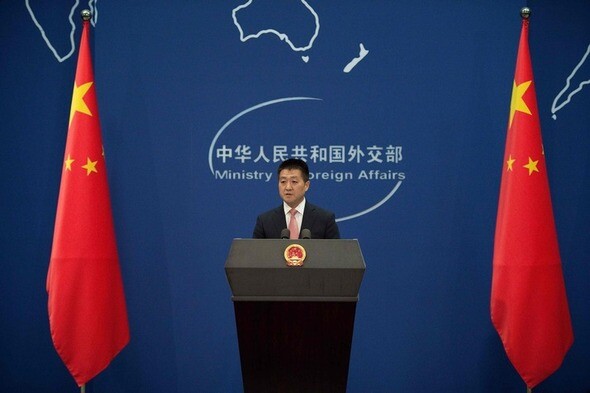hankyoreh
Links to other country sites 다른 나라 사이트 링크
In dealing with North Korea, China managing punishments and moves toward dialogue

China is taking steps to resume dialogue with North Korea in the long run while managing the current situation with signals of stiffer punishments against Pyongyang. The move comes amid speculation over a possible “big deal” with the US on Korean Peninsula issues, with White House officials remarking that the deployment of the THAAD missile defense system on the peninsula should be decided by the next South Korean president.
On the surface, China continues adhering to the same Korean Peninsula policies, which center on three main positions favoring denuclearization, peace and stability, and dialogue- and negotiation-based resolutions. It also hasn’t changed positions in terms of the two-track solution (denuclearization and adoption of a peace regime) and “two-halt” solution (halts to North Korean nuclear and missile testing and large-scale joint military exercises by South Korea and the US) that it proposed in Feb. 2016 and last month.
Chinese Foreign Ministry spokesperson Lu Kang stressed these guiding principles during a regular briefing on Apr. 17.
“China’s policy on the [Korean] Peninsula issue has been correct all along,” Lu asserted, adding that China “hope[s] that all relevant parties, especially these major players to the Peninsula nuclear issue, could also adopt correct policy as China does.”
But with speculation that Washington and Beijing reached an agreement on Korean Peninsula issues at their Apr. 6-7 summit that would include the US holding off on military measures and China stepping up its practical sanctions against the North, attention is focusing on the measures taken by Beijing since the summit, with Apr. 11 reports that North Korean coal was returned and an Apr. 14 announcement of the suspension of Air China flight service between Beijing and Pyongyang.
“From China‘s standpoint, it may be that since it just had a summit with the US, it felt like it needed to present a more proactive posture because the significance and outcome of that summit could be diminished if no progress was made,” explained a diplomatic source in Beijing.
But China has also made it clear its ultimate goal is the resumption of dialogue. In an Apr. 17 op-ed piece, the state-run China Daily called Pyongyang’s decision not to stage a nuclear test for its Day of the Sun holiday on Apr. 15 (the birthday of founding leader Kim Il-sung) its way of acknowledging receipt of the message sent by the US Donald Trump administration with its dispatching of the USS Carl Vinson aircraft carrier to the Korean Peninsula.
“Even if denuclearization isn’t achieved, we need to reduce tensions and create an environment for diplomacy,” the piece stressed.
In another op-ed piece the same day, the Global Times wrote, “The ball that had been in North Korea’s court for the past two days is now in Trump’s.”
It remains uncertain what kind of discussions are taking place between Beijing and Pyongyang. Lu declined to provide specifics when asked on Apr. 17 if China’s Special Representative for Korean Peninsula Affairs Wu Dawei plans to visit North Korea after previously visiting the South.
“We remain in close contact with relevant parties, including the DPRK,” Lu simply said.
By Kim Oi-hyun, Beijing correspondent
Please direct questions or comments to [english@hani.co.kr]

Editorial・opinion
![[Editorial] Intensifying US-China rivalry means Seoul must address uncertainty with Beijing sooner than later [Editorial] Intensifying US-China rivalry means Seoul must address uncertainty with Beijing sooner than later](https://flexible.img.hani.co.kr/flexible/normal/500/300/imgdb/original/2024/0517/8117159322045222.jpg) [Editorial] Intensifying US-China rivalry means Seoul must address uncertainty with Beijing sooner than later
[Editorial] Intensifying US-China rivalry means Seoul must address uncertainty with Beijing sooner than later![[Column] When ‘fairness’ means hate and violence [Column] When ‘fairness’ means hate and violence](https://flexible.img.hani.co.kr/flexible/normal/500/300/imgdb/original/2024/0516/7417158465908824.jpg) [Column] When ‘fairness’ means hate and violence
[Column] When ‘fairness’ means hate and violence- [Editorial] Yoon must stop abusing authority to shield himself from investigation
- [Column] US troop withdrawal from Korea could be the Acheson Line all over
- [Column] How to win back readers who’ve turned to YouTube for news
- [Column] Welcome to the president’s pity party
- [Editorial] Korea must respond firmly to Japan’s attempt to usurp Line
- [Editorial] Transfers of prosecutors investigating Korea’s first lady send chilling message
- [Column] Will Seoul’s ties with Moscow really recover on their own?
- [Column] Samsung’s ‘lost decade’ and Lee Jae-yong’s mismatched chopsticks
Most viewed articles
- 1[Editorial] Transfers of prosecutors investigating Korea’s first lady send chilling message
- 2For new generation of Chinese artists, discontent is disobedience
- 3S. Korea “monitoring developments” after report of secret Chinese police station in Seoul
- 4Xi, Putin ‘oppose acts of military intimidation’ against N. Korea by US in joint statement
- 5[Photo] 1,200 prospective teachers call death of teacher “social manslaughter”
- 6[Exclusive] Unearthed memo suggests Gwangju Uprising missing may have been cremated
- 7N. Korean media upgrades epithet for leader’s daughter from “beloved” to “respected”
- 8[Column] Samsung’s ‘lost decade’ and Lee Jae-yong’s mismatched chopsticks
- 9[Editorial] Intensifying US-China rivalry means Seoul must address uncertainty with Beijing sooner t
- 10[Special reportage- part I] Elderly prostitution at Jongmyo Park